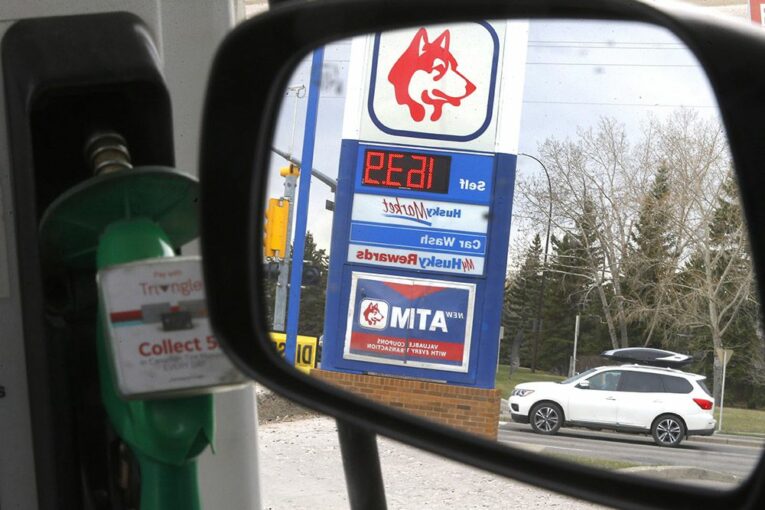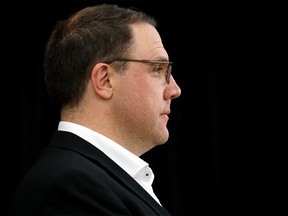
Inflation is roaring at its highest rate since leg warmers were first in fashion in the 1980s — topping 7.7 per cent in the country last month — while escalating energy costs are causing pain for consumers and businesses alike.
What’s a government to do about it?
Here’s an idea: Encourage the responsible production of more energy, as red-hot commodity prices drive inflation higher.
In the short term, however, governments are scrambling for other ways to blunt the immediate effect.
U.S. President Joe Biden is pushing Congress to temporarily lift the federal taxes on gasoline. In Canada, the Trudeau government seems less inclined to provide short-term relief at the pumps.
In Alberta, the provincial fuel tax of 13 cents a litre has been removed since April. With the relief program set to expire at the end of June, the UCP government announced Wednesday it has extended the measure until at least September.
“This is a good policy that is helping Albertans,” newly appointed Finance Minister Jason Nixon said in an interview.
“Fuel costs are impacting the cost of, frankly, food and other things within our supply chain. Everything comes by truck. So this is the quickest way we can have an impact.”
Removing the gasoline tax has cost Alberta’s treasury just over $300 million to date. The province also promised to deliver on previously announced electricity rebates — providing consumers a $50 credit on their bill for three months — beginning in July.
However, it appears a planned natural gas rebate program won’t kick in before October, despite suggestions by Premier Jason Kenney this spring it might arrive sooner.
Mounting costs on several fronts are hammering Alberta consumers and businesses.
So far this month, Canadian regular unleaded gasoline prices have averaged a record $2.06 a litre, according to GasBuddy.
Statistics Canada reported Wednesday that energy costs in May were almost 35 per cent higher than a year earlier; the war in Ukraine has created supply uncertainty and pushed energy markets higher.
University of Calgary economist Trevor Tombe said higher energy costs directly contributed 2.5 percentage points to the rising Consumer Price Index, while its “ripple effect” on other products throughout the economy added another one to 1.5 percentage points.
“Energy is an important input into the production of almost everything,” he said. “Even services are affected.”
Nixon is calling on Ottawa to lift its fuel and carbon taxes from gasoline prices. Such a step would save Canadian motorists nearly $22 to fill up a 100-litre gas tank.
“If Joe Biden in the United States is seeing this as a good policy, I do not know what is taking Justin Trudeau so long to recognize the positive impact you can have for people in this country,” he said.
Others aren’t so sure.

Tombe believes there are effective ways to provide relief in a more targeted way, pointing out that lifting the federal gas tax would cost the government about $500 million a month.
Natural Resources Minister Jonathan Wilkinson told The Canadian Press the Liberal government doesn’t have any immediate plans to reduce the federal excise tax on gasoline.
But the cost pressure on Canadians is ratcheting up.
In Calgary, 48 per cent of local businesses expect to face higher operating expenses in the next three months, yet only one quarter anticipate their operating income will rise, a survey to be released Thursday by the Calgary Chamber of Commerce indicates.
“You have limited pricing power to pass on those higher costs to your consumers,” said chamber CEO Deborah Yedlin.
“We’ve gone from one challenge to another.”
Half of the 499 local business operators surveyed by Statistics Canada in April and May — in collaboration with the Canadian Chamber of Commerce — say they’re concerned about higher input costs.
Four in 10 are worried about rising transportation expenses, while 51 per cent expect to see higher energy prices over the next three months.
Governments should reduce interprovincial trade barriers, eliminate international tariffs and expedite supply chain investments to improve the flow of goods, the Calgary chamber said.
-

Inflation hits highest levels in Alberta in almost four decades
-

Canada’s inflation rate rises to highest since 1983
South of the border, Biden is pressing the U.S. Congress to suspend the 18.4 cent-a-gallon federal gasoline tax for three months.
He’s also called on the oil and gas industry to ramp up output. Earlier this week, Chevron Corp. CEO Mike Wirth shot back in a letter to the president that the sector needs “clarity and consistency on policy matters,” not to be vilified by the administration.
As the energy crisis deepens, one obvious solution is to increase oil and gas production, although that will require additional investment and more confidence in future policy during an era of decarbonization.
The International Energy Agency reported Wednesday that global energy investment will grow by eight per cent this year to US$2.4 trillion, including record amounts of spending on clean energy.
“Although encouraging, the growth investment is still far from enough to tackle the multiple dimensions of today’s energy crisis and pave the way toward a cleaner and more secure energy future,” the Paris-based agency cautioned.
Meanwhile, Alberta Energy Minister Sonya Savage, who is in Washington, D.C. this week to meet with U.S. policymakers, is seeking to promote the ability of the province to grow its oil and gas output.
Oil shipments out of Western Canada could expand by almost one million barrels per day with pipeline optimization plans in the works, unused crude-by-rail rail capacity and the ongoing Trans Mountain expansion, she noted.
“One of the things that would help at the pumps is getting more supply on the market,” Savage said from Washington.
“That would be a more effective long-term strategy. Giving tax relief at the pumps is a short-term strategy and it’s necessary right now to cool inflation and to make gasoline affordable.”
Higher energy prices usually entice the industry to spend more capital to hike output.
However, reluctance by companies to boost production during a period of economic volatility and the continuing pressure to return capital to investors are both having an effect, said Rory Johnston, market economist at investment firm Price Street.
“What we need is more supply,” said Johnston. “Any time they invest in production, it is taking a risk. What we want to do is create a sense of stability.”
Chris Varcoe is a Calgary Herald columnist.
You can read more of the news on source
